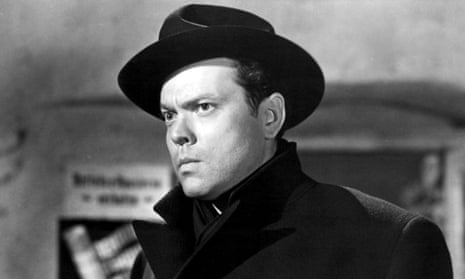‘You used to believe in God!” That’s the devastating accusation – or reminder – hurled at the sinister fugitive Harry Lime by his old pal Holly Martins in this movie’s famous scene, high up on Vienna’s Riesenrad ferris wheel. For a fraction of a second, the memory disconcerts the smooth-talking rogue, until he resumes his cynical and specious charm: his legendary speech about Switzerland’s renowned peace producing only the cuckoo clock is part of Lime’s emotional regrouping, the defiant restating of his amorality. The Third Man – written for the screen by Graham Greene and directed by Carol Reed – is now rereleased for its 70th anniversary. Greene’s script looks less and less secular to me as the years go by.
Martins, an American pulp writer of westerns played by Joseph Cotten, has arrived in postwar Vienna, a city shattered by the fighting and divided into American, British, Russian and French zones. He has been promised a job by Lime – whose existence in the film is nothing more than a rumour, until he emerges from the shadows: Orson Welles, giving an extraordinarily charismatic late-breaking cameo turn of the sort that even Marlon Brando in Apocalypse Now couldn’t match.
On arrival, Martins is unaware of Lime’s notoriety as a black-marketeer and is stunned to learn that Lime is supposedly dead, killed in a banal road accident. From what Martins has been able to discover, Lime was hit by a car and that, according to official reports, two men carried his body to the kerb, both apparently acquainted with Lime: an émigré Czech called Popescu (Siegfried Breuer) and seedy, self-styled “Baron” Kurtz (Ernst Deutsch).
But rumours from other witnesses suggest that a mysterious third man was sighted at the incident, now vanished, and these confusing rumours are as potent and perplexing as discrepancies in the Gospels. Because the indications are that Lime is risen, like a parody version of Jesus. He has resurrected himself, having faked his own death to avoid police capture following his unspeakably evil trade in diluted penicillin causing brain damage in children.
But why on earth did Harry want his old boyhood friend Martins there anyway? To legitimise the cover-up story? To implicate his straight-arrow friend and lessen his own unacknowledged guilt? Or does he want Martins in some mysterious way to save him?
Martins sticks around in Vienna to investigate the mystery, to the icy displeasure of British officer Major Calloway (Trevor Howard, in a raffish beret and civilian-style duffel coat over his uniform). Martins accepts the hospitality of an educational agency on the understanding that he will give a lecture on the “The crisis of faith in the modern novel” – another religious touch – and ends up betraying Lime to the cops, though it is like betraying Judas Iscariot rather than Jesus.
There is a wonderful supporting romantic role for Alida Valli as Anna Schmidt (rather Ingrid Bergman-esque), the young Czech actress who is hopelessly in love with Lime, partly because he provided a fake Austrian passport for her, which kept from being repatriated to the Russians. It was Lime’s crookedness, his evil that saved her from Soviet tyranny and she can never forget it. As she says: “I don’t know anything any more, except I want to be dead, too.”
Vienna is unforgettably rendered in Robert Krasker’s camerawork, the Dutch angles mimicking the city’s structural disrepair and the sense of a whole moral world knocked sideways. It is, as someone says, a “closed city”, but very like the “open city” of Rome depicted by Roberto Rossellini, and perhaps also like the closed city of Belfast in Reed’s Odd Man Out (1947). The infinitely catchy zither theme from Anton Karas plucks and whines and clamours from the screen: Greek music that was ironically fated to sound Austrian.
This is a movie about sin: the wretchedness of the sinner who accepts his destiny as one of the damned, running frantically through the tunnels of Vienna’s sewers as if already in hell.

Comments (…)
Sign in or create your Guardian account to join the discussion